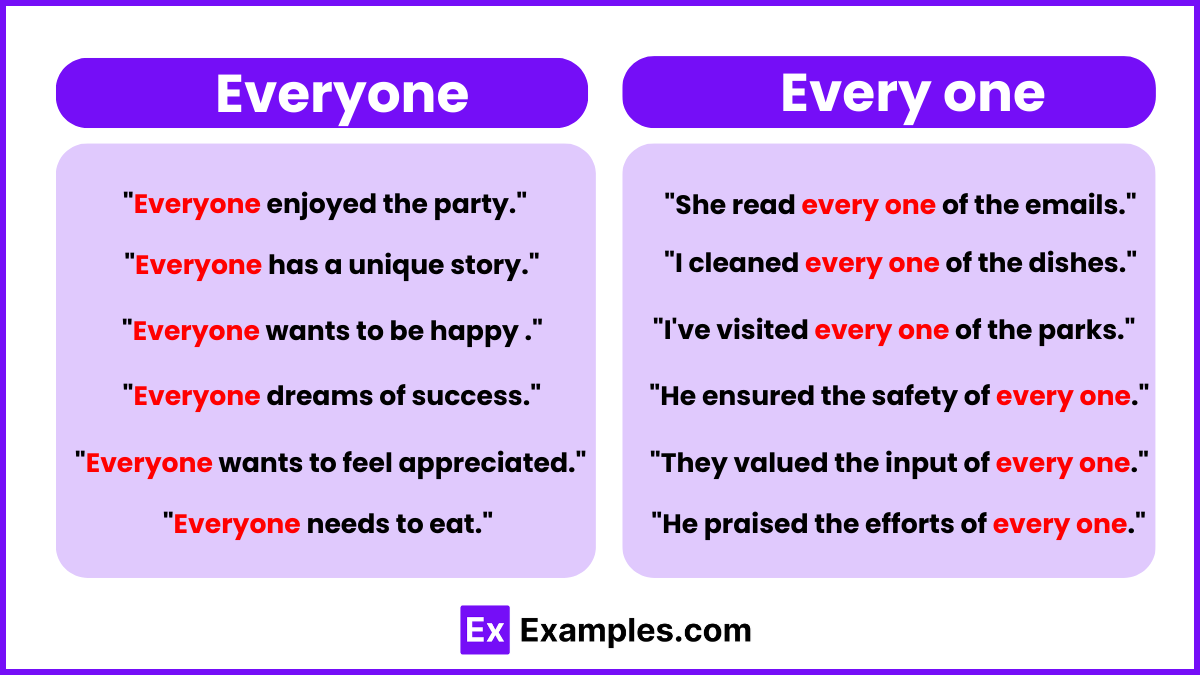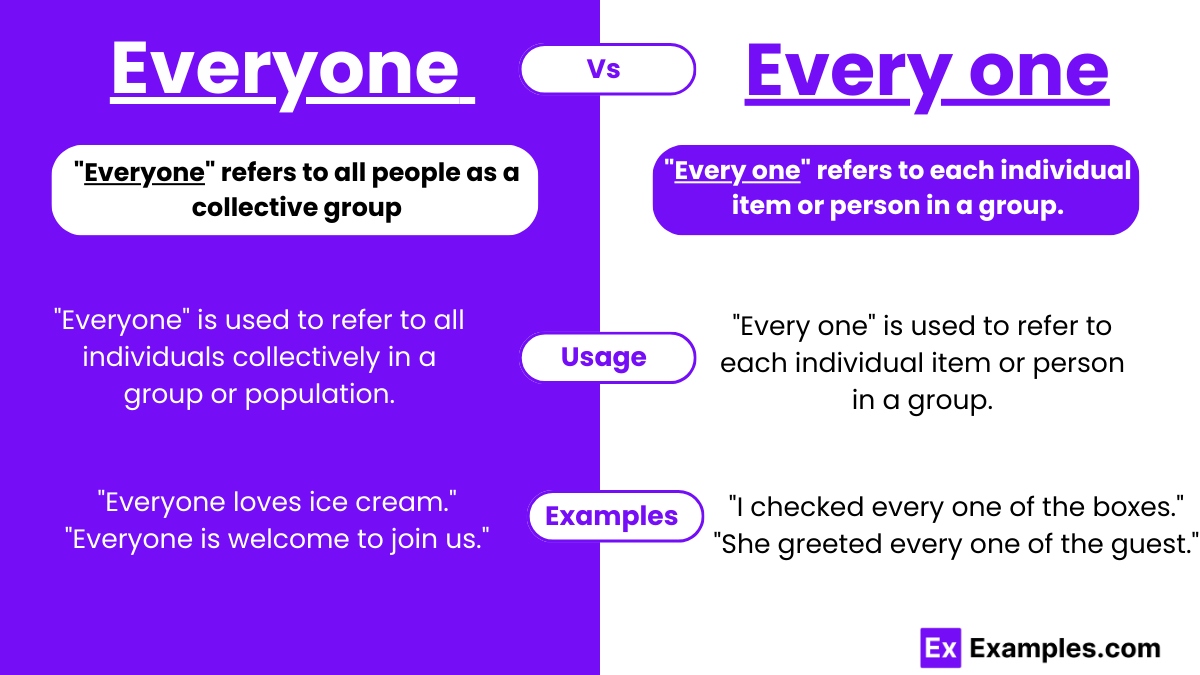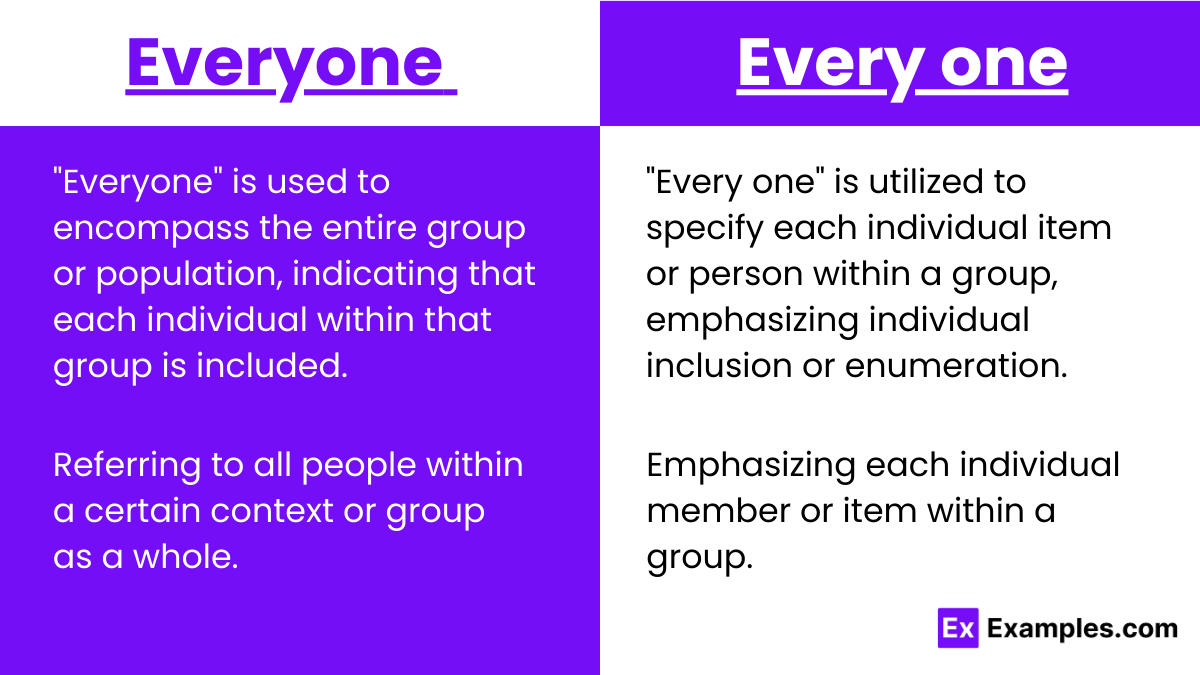Everyone vs Every one – Examples, Differences, Usage, Tips, PDF
In the intricate tapestry of English grammar, the distinction between “Everyone” and “Every one” serves as a fascinating study of how slight variations in phrasing can lead to significantly different meanings. At first glance, these expressions seem interchangeable, both hinting at inclusivity and totality within a group. However, a deeper dive reveals that “Everyone” is an indefinite pronoun tailored exclusively to address all individuals within a human collective, embodying a sense of unity and collective identity. This subtle differentiation invites students to appreciate the precision required in language, emphasizing the importance of context in choosing the correct expression.
On the flip side, “Every one” expands the scope beyond just the human realm, allowing for the inclusion of items, ideas, or entities in a group, with each member standing out for individual acknowledgment. This phrase, often followed by “of,” invites a closer examination of each component within a collective, whether animate or inanimate. The pronunciation nuances between the two—where “Everyone” flows with a singular emphasis and “Every one” demands a more deliberate articulation—mirror their distinct applications. Through understanding “Everyone” versus “Every one,” students embark on a journey to mastering the art of nuanced communication, enhancing both their written and spoken English.
Everyone and Every one – Meanings
Everyone: “Everyone” functions as an indefinite pronoun within the English language, casting a wide net to encompass every person within a specified group or context. It serves as a collective term that unites individuals under a single, inclusive banner, without distinguishing between them on any basis. The term “everyone” is particularly useful in sentences where the emphasis is on the group as a whole, rather than on individual members. This makes it a common choice in both casual conversations and formal discourse when referring to people in general, embodying a sense of universality and collective identity.
Every one: “Every one,” written as two separate words, emphasizes the individuality of members within a group, focusing on each entity distinctly. This phrase is often followed by “of” and can pertain to not just people, but also objects, ideas, or instances, allowing for a broader application beyond human subjects. The usage of “every one” invites a closer examination of the components of a collective, acknowledging the unique presence or contribution of each member. It’s a phrase that lends itself to contexts where the distinction or acknowledgment of individual elements is crucial, ensuring clarity and precision in communication.
Summary
“Everyone” operates as a broad, unifying pronoun that encapsulates all individuals within a given context, treating the group as a singular entity without focusing on the distinct attributes of its members. It’s ideal for general references to people, enhancing a sense of collective unity in both informal and formal settings. Conversely, “Every one” separates and highlights the uniqueness of each member within a collective, applicable not only to individuals but to objects and concepts as well.
Difference Between Everyone and Every one
“Everyone” and “Every one” may sound similar but hold different meanings and usages in English, crucial for precise communication.
| Aspect | Everyone | Every one |
|---|---|---|
| Function | Indefinite pronoun | Phrase (determiner + noun) |
| Usage | Refers to all individuals in a group | Refers to each individual or item in a group |
| Context | People in general | Individual members or items |
| Emphasis | Collective unity | Individual distinction |
| Application | Humans only | Humans, objects, ideas |
| Common Pairings | Alone, without following nouns | Often followed by “of” |
| Sentence Examples | “Everyone laughed at the joke.” | “Every one of the cookies was eaten.” |
| Pronunciation | Emphasis on the first syllable | Stress on first and third syllables |
| Grammatical Role | Subject or object | Subject in “every one of” constructions |
| Implication | General inclusion without specifying individual members | Specific attention to each member or item. |
How to Remember the Difference Between Everyone and Every one
To remember the distinction between “Everyone” and “Every one,” consider these tips:
- Associate “Everyone” with People: Think of “Everyone” as a way to refer to all people in a group, emphasizing the group as a whole.
- Break Down “Every one”: Visualize “Every one” as “Every” + “one,” highlighting each individual member or item in a group.
- Contextual Clue: Use “Everyone” for general statements about people. Use “Every one” when you could replace it with “each one” in the sentence.
- “Of” Usage: Remember that “Every one” is often followed by “of,” which is not the case with “Everyone.”
- Think of Inclusivity vs. Specificity: “Everyone” is inclusive, referring to people in a broad sense. “Every one” is specific, focusing on individual elements.
- Pronunciation Cue: Notice the pronunciation difference; “Everyone” has a stress on the first syllable, while “Every one” stresses the first and third syllables.
By keeping these strategies in mind, you can accurately distinguish between “Everyone” and “Every one” in your writing and speech.
Examples of Everyone and Every one

“Everyone” and “Every one” is key for accurate expression. Here are examples to clarify their unique applications.
Everyone Examples:
- “Everyone in the class passed the exam.”
- “Can everyone hear me at the back?”
- “Everyone loves a good mystery.”
- “Not everyone agrees with that idea.”
- “Everyone brought a dish to the potluck.”
Every one Examples:
- “Every one of the paintings was sold.”
- “She read every one of the books on the shelf.”
- “Every one of the guests received a thank you card.”
- “I’ve visited every one of the national parks.”
- “He answered every one of the questions correctly.”
When to Use Everyone and Every one
Navigating the nuances between “Everyone” and “Every one” is crucial for clear communication, as each term serves a distinct purpose based on context and emphasis.
-
Usage of “Everyone”
- Referring to all people within a certain context or group as a whole.
- Making general statements that apply to an entire group of people.
- You need an indefinite pronoun to address a collective without specifying individuals.
-
Usage of “Every one”
- Emphasizing each individual member or item within a group.
- The context requires highlighting the uniqueness or individuality of elements.
- It’s followed by “of” to detail or list specific components of a group.
Tips for Everyone and Every one
“Everyone” and “Every one,” consider these practical tips:
- Group vs. Individuals: Use “Everyone” when referring to a group collectively, without singling out individuals. Opt for “Every one” when focusing on each member or item individually.
- Syntax Clue: “Everyone” stands alone, whereas “Every one” often appears in the phrase “every one of,” indicating a closer look at individual components.
- Human Element: Remember that “Everyone” typically pertains to people, emphasizing a collective of individuals. “Every one” can refer to people or things, stressing each element’s distinct presence.
- Substitution Test: If you can replace it with “everybody” without altering the meaning, use “Everyone.” If “each one” fits better, “Every one” is likely the correct choice.
- Context Matters: Pay attention to the sentence’s context. If discussing a general observation about a group, “Everyone” is suitable. If detailing aspects about each member or item.
Exercise for Everyone and Every one
- __________ at the party enjoyed the music.
- __________ of these apples is ripe and ready to eat.
- __________ knows the rules before we start the game.
- I’ve checked __________ of the boxes, and they’re all sealed properly.
- __________ was asked to bring their own water bottle.
- __________ of the students has submitted their assignment on time.
- __________ loves a sunny day at the beach.
- __________ of the reasons he gave was valid.
- __________ in the neighborhood is invited to the block party.
- __________ of the chapters in this book has its own theme.
FAQs
What Is a Better Word for Everyone?
A better word for “everyone” is “everybody.” Both terms are interchangeable and refer to all people within a specified group or context, emphasizing inclusivity without distinction.
Does Everyone Mean All?
Yes, “everyone” means all people within a certain context or group, implying a collective reference to each individual without exception.
When Should I Use Everyone or Everybody?
Use “everyone” or “everybody” interchangeably when referring to all people in a group. The choice between the two is based on personal preference or the flow of the sentence.
What Is the Rule of Everyone?
The rule of “everyone” is to use it as a singular pronoun referring to all members of a group collectively, requiring singular verb forms in sentences, such as “Everyone is here.”




